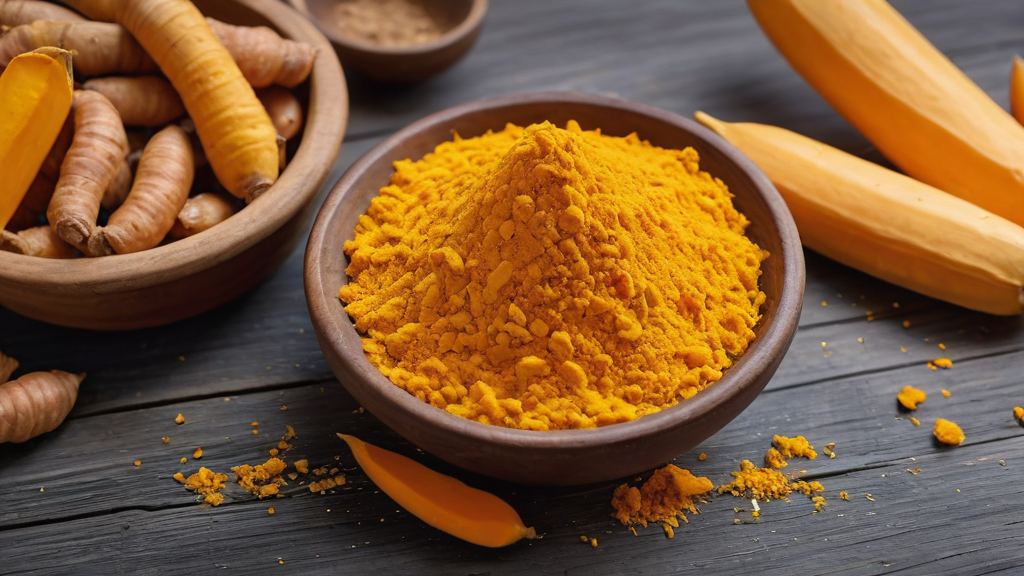A Detailed Look at Turmeric and Its Valuable Content
Turmeric is a spice derived from the root of the plant known as “turmeric longa.” This perennial plant, belonging to the ginger family, is the source of the valuable turmeric, whose main active ingredient is curcumin.
Native to India and other Asian countries, turmeric is extracted from the rhizomes, which can be used fresh or boiled in water, dried and finally ground to obtain a deep yellow-orange powder. This powder is commonly used as a coloring and flavoring in numerous Asian cuisines, being a fundamental ingredient in the preparation of curry. Additionally, turmeric is available in various forms, including capsules, teas, powders, and extracts.
The health benefits of turmeric according to specialists
According to nutrition expert at the Cleveland Clinic in the United States, Nicole Hopsecger, turmeric has numerous health benefits that support its integration into the daily diet. Curcumin, the main component that gives turmeric its yellowish tone, has antioxidant and anti-inflammatory properties, which makes it a valuable ingredient.
Unveiling the nutritional treasures of turmeric
According to Mary-Eve Brown, nutritionist and clinical oncology diet specialist at Johns Hopkins Medicine in the United States, like other colorful plant foods, turmeric is rich in phytonutrients that can protect the body by neutralizing free radicals and the preservation of cellular integrity. It has been observed that diets rich in plant foods are associated with the prevention of medical conditions such as cancer and cardiovascular diseases.
For her part, Paola Hernández, a graduate in Nutrition and a professor at the ISALUD University in Argentina, emphasized that turmeric provides health benefits thanks to its antioxidant and anti-inflammatory properties. However, it is essential to remember that, in order to take full advantage of these benefits, it is necessary to maintain a balanced diet and a healthy lifestyle, since there are no miracle foods.
The multiple benefits of turmeric for the body
Turmeric as an ally against inflammation
“Anyone looking to manage inflammation can benefit from incorporating turmeric into their diet,” Brown said. Research indicates that curcumin may be useful in diseases associated with inflammatory processes, including arthritis and ulcerative colitis.
A study conducted on patients suffering from ulcerative colitis, published in the journal Randomized Controlled Trial, revealed that those who consumed 2 grams of curcumin per day along with prescribed medication were more likely to remain in remission compared to those who received the medication alone. .
“Although it won’t necessarily be helpful during an acute episode, turmeric may help prolong the remission period,” Hopsecger explained.
Benefits of Turmeric for Brain Function
Consuming turmeric can support brain function and improve memory. A clinical trial published in The American Journal of Geriatric Psychiatry showed that 90 milligrams of curcumin taken twice daily for 18 months helped improve memory function in adults without dementia. This is attributed to the reduction of brain inflammation and the antioxidant properties of curcumin, which contributes to less cognitive degeneration.
Hopsecger recommended always consulting with a health professional if you have questions or concerns related to memory problems.
Turmeric as an alternative for indigestion
There is preliminary evidence to suggest that turmeric may be as effective as the drug omeprazole in relieving indigestion symptoms, according to a recent study published in the journal BMJ Evidence-Based Medicine.
Researchers randomly assigned 206 patients with recurrent stomach upset to one of three treatment groups, and results indicated significant reductions in symptom severity in those who consumed turmeric.
Delicious ways to incorporate turmeric into your daily diet
Practical tips to include turmeric in your recipes
Turmeric can be added to various dishes such as soups, stews, rice, vegetable juices, salads, among others. Likewise, it is ideal for preparing an infusion with green tea, pepper, turmeric and a few drops of lemon. This spice combines perfectly with dishes based on rice, stews, lentils, eggplant, spinach, chicken and fish.
Precautions to take into account when consuming turmeric
The compounds in turmeric that support digestive health may cause irritation in some people if consumed in large quantities. Likewise, its purifying properties can increase the risk of bleeding in certain cases. For this reason, people with blood disorders or those who are prone to gastric irritation should moderate their consumption of turmeric.
A turmeric tea can be prepared with pure turmeric powder or grated, ground or dehydrated turmeric. Several fermented turmeric preparations, marketed as tea products, claim to have higher concentrations of biologically absorbable curcumin. A simple recipe for making turmeric tea includes water or milk, turmeric, cinnamon, honey and black pepper, which is boiled and infused for a few minutes before serving.
